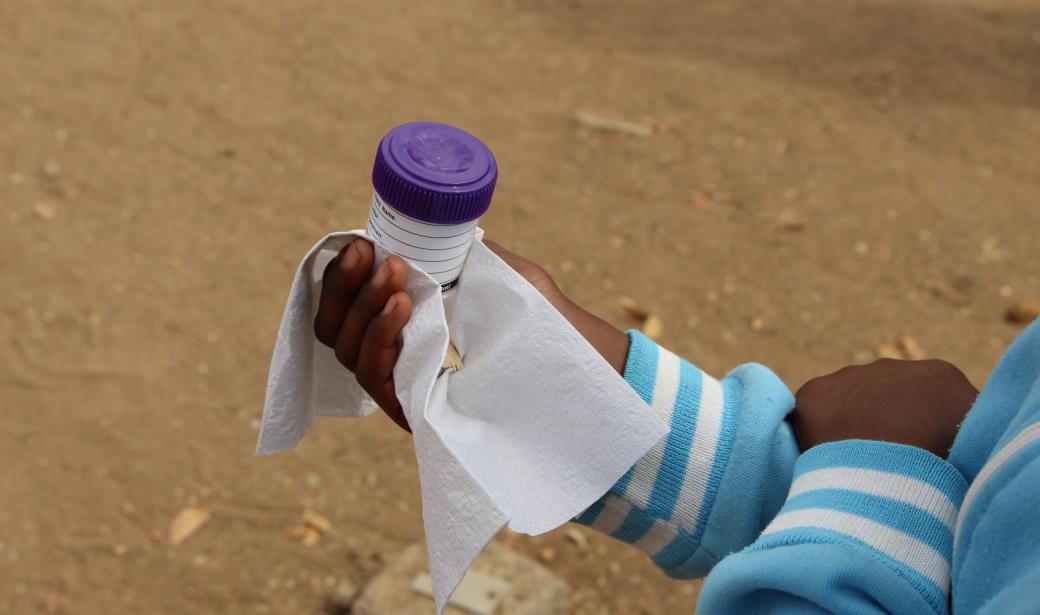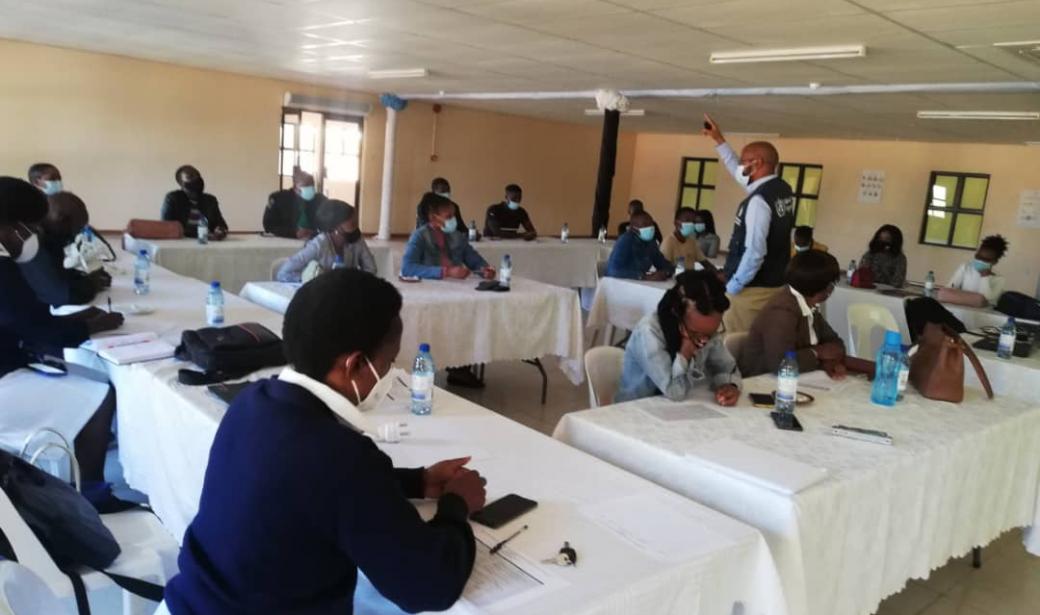Botswana is taking steps towards the elimination of intestinal worm infections in school-going children. However, the infestations of both schistosomiasis (SCH) and soil-transmitted helminth (STH) infections are widespread throughout the country. These neglected tropical diseases (NTDs) left untreated cause profound physical and cognitive impairment in children and limit the productivity and economic development of the affected communities. What Government of Botswana and its partners do to eliminate the NTDs?
Hygiene education in schools
Intestinal worms are usually associated with poor sanitation including poor access to toilets (latrines) and handwashing facilities. When there is no access to toilets and people defecate in the fields, the soil becomes contaminated. Worm eggs can persist for months or even years in the soil, given the right conditions. Soil-transmitted helminths (STHs) are a group of intestinal parasites. The most common STH-causing parasites are roundworm, whipworm and hookworm. Infection reduces the body’s ability to absorb nutrients and vitamins. Some intestinal worms are transmitted when soiled hands contaminated with human faeces come into contact with the mouth (faecal-oral contact). Larvae of other types of intestinal worms penetrate the skin of the feet that come into contact with contaminated soil.
The worms infestation has some far-reaching consequences for children. The worms feed on children’s blood and nutrients, leading to stunting, iron deficiency anaemia and increased risk of other infections. These diseases, if left untreated can cause profound physical and cognitive impairment in children and can limit the productivity and economic development of the affected communities in Botswana.
Stakeholder engagement to raise awareness and support the elimination of NTDs
Botswana’s interventions to eliminate STHs are ongoing but the progress has not been consistent and uniform in all districts due to funding challenges. Between March 2020 and October 2021 the project “Accelerating Elimination of Neglected Tropical Diseases in Botswana” funded by the Government of Japan is implemented to cover this gap. The overall goal of this project was to support the government’s interventions to accelerate the control and elimination of STHs and ultimately contribute to ending the regional epidemic of NTDs in Africa and achieving the Sustainable Development Goals (SDGs) particularly the target 3.3. “In line with the SDG 3 which aims to ensure healthy lives and promote the well-being of all peoples of the world, as well as our own national Vision 2036, the Government of Botswana is committed to restoring dignity and health to communities and individuals affected by NTDs” says Dr Edwin Dikoloti, the Minister of Health and Wellness of Botswana.
Prevention and control of disease vectors
The project targets nine districts endemic to STHs. The interventions give special focus on reaching primary school-going children, as they are the most affected groups in the endemic communities. The major interventions include communities, schools and partners’ awareness, capacity building for healthcare workers and other stakeholders, the establishment of sentinel surveillance sites for STHs and SCH and logistical support for mass-drug administration (MDA) for treatment of children.
A total of seven primary schools in the Chobe district were covered during an impact assessment run as a project activity. The targeted primary schools are the following: Parakarungu, Kachikau, Pandamatenga, Kasane, Lesoma, Mabele, and Kavimba.
WHO and MoHW health workers were able to collect 427 faecal samples from primary school learners. More schools in Chobe and Maun were further surveyed. Children in school benefited most from an integrated health package including hygiene education especially on the risk factor for contracting worm infestations. The results for both laboratory investigation and awareness-raising activities for children were entered into the ESPEN Collect software application and transferred to the WHO server where data cleaning and analysis is ongoing.
WHO and MoHW health workers were able to collect 427 faecal samples from primary school learners. More schools in Chobe and Maun were further surveyed. Children in school benefited most from an integrated health package including hygiene education especially on the risk factor for contracting worm infestations. The results for both laboratory investigation and awareness-raising activities for children were entered into the ESPEN Collect software application and transferred to the WHO server where data cleaning and analysis is ongoing.
The collected stool samples are analyzed in the laboratory. Once the data from the samples have been recorded and analyzed, it will be used to guide implementation and further actions in the STH elimination programme. Every detailed procedure in the process is a small step taken towards the elimination of STH infestations and eventually towards ending the prevalence of Neglected Tropical Diseases in Botswana.
The 2015 mapping of NTDs in Botswana revealed that the national average prevalence of Soil-transmitted Helminthiasis is 20%, which is a threshold for mass drug administration.
Treatment for STHs through MDA of Albendazole was conducted for all the 9 districts, for school children aged 5-14 years with a prevalence of 20% and above. A total of 121,472 students received treatment in all the targeted schools translating into over 90% coverage. Preparatory work towards MDA included social mobilization as well as training for both district staff and teachers.
Treatment for STHs through MDA of Albendazole was conducted for all the 9 districts, for school children aged 5-14 years with a prevalence of 20% and above. A total of 121,472 students received treatment in all the targeted schools translating into over 90% coverage. Preparatory work towards MDA included social mobilization as well as training for both district staff and teachers.
Capacity building of the Health Workers
Itumeleng Kanwi, a community health nurse at the Chobe DHMT, trained during the project, says that the communities in her district have responded in the past positively to STH elimination strategy and the previous MDA programme. "The good part is that the coverage is always above 99%. It means we are covering all our students/population that we are supposed to cover". She further said, "I believe it has done wonders to our kids. Some of the parents would talk amongst themselves, that their children used to struggle to eat, but ever since these tablets were given at school, the children are better!".
Way forward towards elimination
While much has been achieved in Botswana during the interventions supported by the Government of Japan there is still important work towards the elimination of these neglected diseases that kill, disfigure, stigmatize and debilitate too many children every year.
“I believe, to address NTDs is equal to secure and protect people’s lives and their dignity. Therefore, I sincerely hope that Botswana’s fight against NTDs will continue to be accelerated and will be over in the very near future” says HE Hoshiyama Takashi, Ambassador of Japan in Botswana.
The contribution of the Japanese Government will go a long way to help advance the progress of all the SDGs, from reducing poverty and malnutrition to improving water and sanitation in Botswana.
Within a systemic and cross-cutting approach, the government supported by the right partners will continue its work guided by the WHO’s core strategies to tackle the burden of NTDs: preventive chemotherapy, intensified case management, control of disease vectors, provision of clean water and sanitation and veterinary public health measures.
“I believe, to address NTDs is equal to secure and protect people’s lives and their dignity. Therefore, I sincerely hope that Botswana’s fight against NTDs will continue to be accelerated and will be over in the very near future” says HE Hoshiyama Takashi, Ambassador of Japan in Botswana.
The contribution of the Japanese Government will go a long way to help advance the progress of all the SDGs, from reducing poverty and malnutrition to improving water and sanitation in Botswana.
Within a systemic and cross-cutting approach, the government supported by the right partners will continue its work guided by the WHO’s core strategies to tackle the burden of NTDs: preventive chemotherapy, intensified case management, control of disease vectors, provision of clean water and sanitation and veterinary public health measures.
Pour plus d'informations ou pour demander des interviews, veuillez contacter :
Cristina Birsan
External Relations and Partnerships Officer
email: birsanc [at] who.int (birsanc[at]who[dot]int)
Tel: +26774620807









